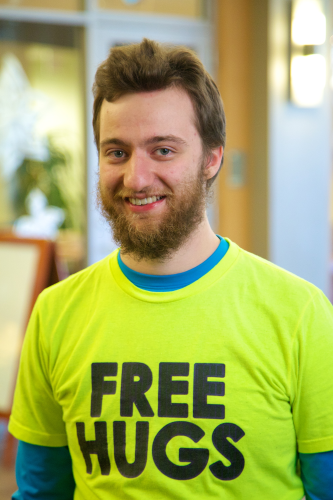Feb 10, 2014
Just in time for Valentine's Day: Insights from a professional hugger
Just in time for Valentine's Day: Insights from a professional hugger
CHICAGO — During his freshman year at DePaul University David Melia wrote and published a book about his free hugs campaign and how to connect with others emotionally. He used the proceeds from the sale of “Free Hugs: It's More Than A Campaign — It's A Lifestyle” to finance a hug tour in around the United States.
Melia, who has been a professional hugger for seven years, explained how giving hugs to others and being open to your feelings and emotions can make Valentine's Day more enjoyable and less lonely.
"My goal with free hugs is to spread love and make people happy one hug at a time," he said. "At its core, free hugs is about love and connecting with people, something that can be applied to everyday life, including Valentine's Day."
Melia, who can be seen all over Chicago with his personalized "free hugs" T-shirt, was first inspired to become a professional hugger after hugging someone outside the Art Institute who told him to keep hugging because he was saving lives. He took his passion for hugging and connecting with others to DePaul, where he studies philosophy and entrepreneurship. Melia, a Chicago native, explained that DePaul was the ideal place to set up his free hugs campaign because of its urban location and openness to the idea of helping others.
"I hope to turn my free hugs campaign into a nonprofit organization to help make the world a better place," said Melia. "The simple act of hugging someone can really heal that person emotionally, it is a great way to connect with somebody and it can give them a reason to smile."
Relational communication expert Tim Cole explained that hugging is a form of affectionate communication, which is vital to the social development of humans. He noted that the mindset of single people tends to change around Valentine's Day and they become more cognizant to the fact that they don't have a partner.
"The research consistently shows that the benefits of affectionate communication produces an array of health benefits and it is critical to humans and our survival. Receive a touch or hug is important to the health of humans," noted Cole, an associate professor in the College of Communication at DePaul.
"Being affectionate is important for forming close bonds with others," Cole said. "The simple act of hugging can create an attachment with another person that has the potential to last a lifetime."
Melia wrote the first two chapters of his book in his creative writing class and was inspired with the notion of using the book to finance a 90-day hug tour around the country, in which he hugged an estimated 2,500 people.
In the book, Melia uses photographs to diagram different types of hugs, including "sandwich hug" and the "running jump hug" where you catch someone in the air with a big hug.
Melia explained that giving a hug to a stranger can be tricky but his advice is to remain relaxed and unobtrusive and the hugs will come to you.
“David's project was both personal and scholarly. I was intrigued by the subject matter of David's book and I urged him to consider many different perspectives. He incorporated references to the German sociologist Georg Simmel, who explored the consciousness of the modern city-dweller," said author Joseph Suglia, a lecturer in the College of Liberal Arts and Social Sciences at DePaul.
"Some consider hugging to be intrusive or invasive, and David emphasizes in his book that the hug should be open and consensual,” Suglia said.
During his career as a professional hugger, Melia noted he has hugged more than 50,000 people and discovered that Chicago, Denver and San Francisco were the best cities to give and receive hugs. He described his most positive experience in Chicago when he hugged a group of tourists having a bad day. They emailed Melia later to thank him for the hug and let him know it turned around their whole trip.
On his tour, one of the emotionally moving experiences was when he attended the Aurora Memorial in Aurora, Colorado, on the anniversary of the shootings. Melia was touched by the way the community joined together after the tragedy and their perseverance and optimism moved him. He visited the healing wall and the quotes inspired him to keep traveling on his tour and give out more hugs.
Melia believes hugging can be used to heal and cure depression. The website Positive Psychology News reported that hugging someone for more than 20 seconds releases the hormone oxytocin into your body, which increases happiness and makes, you feel good.
Melia, who averages 50 hugs a day, is planning a new hug tour around the U.S. and is working on an iPhone application to help individuals find the best city to receive a free hug.
“To me, it’s more than a campaign, it’s a lifestyle,” said Melia. “If done properly, opening yourself up to more hugs can bring a lot more love and happiness into your life.”
Watch a video interview with Melia at http://depaulne.ws/ValentineVideo.

David Melia, a professional hugger and sophomore at DePaul University, shares insights on how to make meaningful connections with others on Valentine's Day. He is the author of “Free Hugs: It's More Than A Campaign — It's A Lifestyle,” in his book Melia talks about how he gave more than 50,000 hugs in seven years. (Photo by Jeff Carrion)
